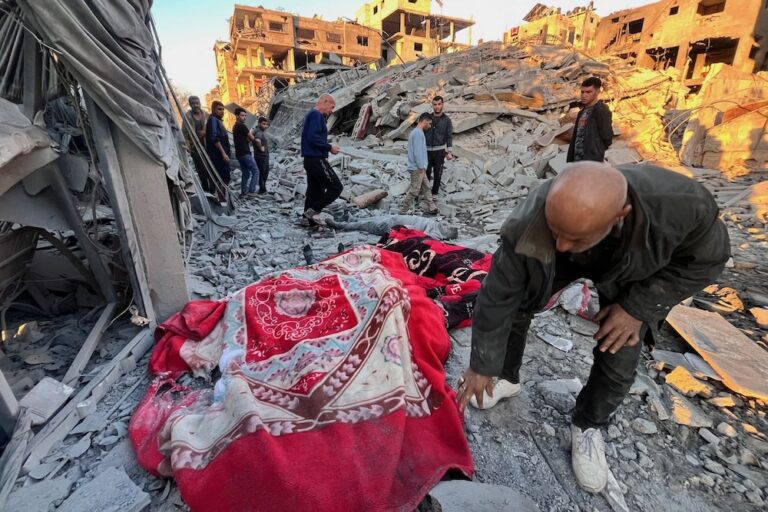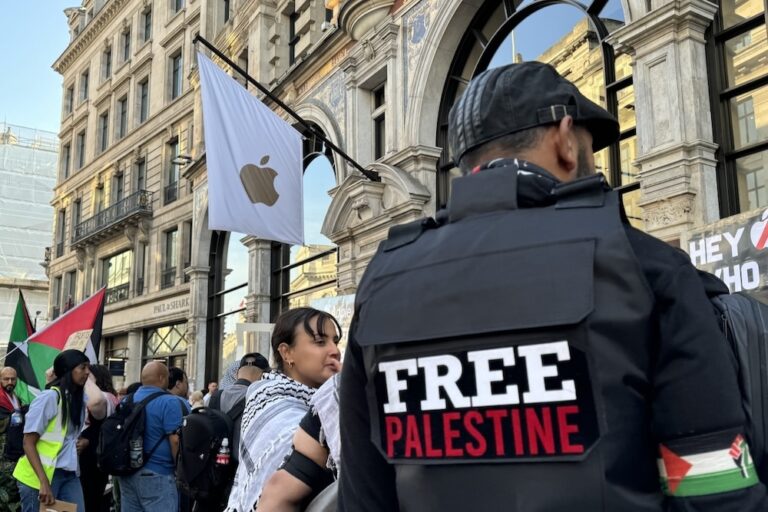(RSF/IFEX) – The following is a 28 December 2001 RSF open letter to Israeli Minister of Defence Benjamin Ben-Eliezer: Mr. Benjamin Ben-Eliezer Minister of Defence Tel Aviv, Israel Paris, 28 December 2001 Dear Sir, We hereby wish to inform you that we have taken note of the “Report on injury of foreign journalists covering the […]
(RSF/IFEX) – The following is a 28 December 2001 RSF open letter to Israeli Minister of Defence Benjamin Ben-Eliezer:
Mr. Benjamin Ben-Eliezer
Minister of Defence
Tel Aviv, Israel
Paris, 28 December 2001
Dear Sir,
We hereby wish to inform you that we have taken note of the “Report on injury of foreign journalists covering the violence in the West Bank and Gaza and operational procedures implemented by the Israeli Defence Forces” (1), made public ten days ago, on 18 December 2001, by the spokesperson of the Defence Ministry.
This report was a response to complaints addressed on numerous occasions to the Israeli authorities by a large number of journalists from local (Israeli and Palestinian) and international media following the proliferation of serious acts of violence committed against them since the beginning of the second Intifada. At least 45 journalists have been injured by bullets in the Occupied Territories since 29 September 2000. In almost all cases, it appears highly probable that the shots were fired by the Israeli armed forces.
Several reports written by human rights organisations (2) and press freedom organisations (3), including Reporters Sans Frontières, have verified and documented these facts. In this respect, you offered us your cooperation and facilitated our investigative work in the field by officially receiving our representatives on several occasions, both in Paris and in Jerusalem. During these meetings, our organisation repeatedly drew your attention to the need to open in-depth inquiries into these acts of violence without delay, to take coercive measures against those responsible, and to envisage adequate procedures to ensure that all risk of fatal injury is avoided.
Most importantly, we submitted to you a detailed report containing, in particular, twelve proposals for concrete measures to reinforce the protection of journalists operating in high-risk areas (4). We furthermore invited you to participate in the press conference that we organised in July 2001 in Jerusalem, at which we made public the conclusions of that report. You accepted our invitation and we noted with satisfaction your public commitment, during that press conference, to follow some of our recommendations.
The publication of the report that you have just put out constitutes one part of that commitment. Unfortunately, the content of the report has proved to be highly disappointing, for it provides very little new information and corresponds only very partially to the commitments made by your government. Although we are very pleased to see here a written confirmation of the commitments made orally this summer (e.g. regular dialogue with the FPA (5), conferences to inform senior officers, instruction of soldiers through videos), our satisfaction ends there. Without reminding you of certain factual errors in the report, we deplore the fact that seven essential points were neglected in that document:
1. Response time. Although the defence ministry has met its commitments by making this report public, this has taken place very late – over one year after the incident, in some cases. This substantially reduces the chances of being able to reconstruct scenarios of these events and thus of identifying individual and collective responsibilities. As you yourself note, “the review was conducted in a forthright effort to investigate the cases as best as possible, and to produce conclusive results yet this was made difficult by the passage of time” (6). We think that you should have reacted in each of these cases with the same promptness as you did on two particular occasions, i.e. when Yola Monakhov and Ben Wedeman were injured. In the cases of these two journalists working for major US media, your services proved to be highly efficient, and we deplore the fact that all investigations were not undertaken with the same rapidity.
2. List of cases considered. The report that you have put out covers seven cases of journalists injured by bullets (7). It is based on the list of incidents drawn up by the FPA in April 2001 (8). But this list includes only part of the reality of the problem. It does not feature cases of Palestinian journalists working for Palestinian media since the FPA’s mandate is limited to questions concerning the foreign press operating in Israel and the Occupied Territories. Furthermore, the list has grown much longer since April 2001. We are therefore still waiting for the follow-up to your report, regarding the 38 other cases that we have reported.
3. Context of the incidents. In your report you stress, at length, the dangers facing journalists during clashes between the Israeli armed forces and Palestinian opponents. We have never questioned the existence of these dangers which are, as you point out, risks inherent in the nature of journalistic work in a context of armed conflict. Nevertheless, you could not have failed to note in the report we submitted to you that, in the majority of the 45 cases cited, the journalists were injured when they were outside the field of fire or sometimes even, worse still, well away from any incident, as if they had been deliberately targeted. On this specific point your report confuses the issues and does not provide the answers hoped for.
4. Reliability of the investigations. We note, with regret, that your report contains absolutely no new information concerning the seven cases that you cite. All the details mentioned were already present several months ago in statements made by the ministry to the Israeli press and in various public declarations by the Israeli government. They were furthermore recorded, often with more detail, in the report that we published in July 2001. Moreover, you yourself recognise the superficiality of your investigations: “We regret that we are unable to furnish more substantial information in some of the cases” (9). You impute the failure of your investigations to the fact that the cases in question are not recent. Yet this is only a part of the explanation; we could, in many cases, mention sources of information that were disregarded, starting with the victims themselves.
5. Undertaking to improve investigations. You note in your report that you have set up a procedure for gathering information more quickly when incidents involving journalists occur. We have seen that these do exist. However, we have reservations as to the use that you subsequently make of that information. In some cases appropriate inquiries are undertaken, which proves the efficiency of your services when there is a real political will (e.g. the case of Egyptian journalist Tarek Abdel Jaber, cited in your report). But in several cases since then the incidents reported to you have not been properly investigated. That is the case, for example, of the incident in which the armoured car of AP photographer Elizabeth Dalziel was shot at by Israeli soldiers on 5 October 2001. As the FPA rightly pointed out, three months after the incident the inquiry is still under way and as time goes by it becomes increasingly unlikely that it will ever lead anywhere. This situation is unacceptable.
6. Case of Bertrand Aguirre. Likewise, the case of French journalist Bertrand Aguirre seems particularly shocking. On 15 May 2001, this TF1 journalist was hit in the chest by an M16 bullet in Ramallah. The scene was filmed by three television crews. The films, broadcast throughout the world and which we viewed several times, clearly show an Israeli border guard get out of his car, take aim, adjust his gun and fire a shot – one only – in the direction of the journalist. Bertrand Aguirre immediately collapsed and owes his life to his bullet-proof jacket. In view of the strong reactions to this extremely violent incident, a serious inquiry seemed to have been launched. Testimonies and evidence were collected. Yet, under a false pretext (10), the case was closed on 12 September 2001 (11). We are particularly shocked to find no trace of this affair in your report, which discusses, at length, another incident that took place two months later, on 13 August 2001 (12).
7. Impunity. To conclude, it is difficult for us to hide our disappointment and discontent as regards your report. It took you over a year to study fewer than one of six cases. This causes us to fear that, in the vast majority of cases, no satisfactory conclusions will ever be reached on the circumstances in which dozens of journalists have been injured. Consequently, it will not either be possible to take punitive measures against the members of the Israeli armed forces involved. What is the value of the assertion that the press is free to work in the Territories if the Israeli armed forces feel they can use their arms against journalists without being accountable for their acts?
We are obliged to note that inquiries worthy of the name, into the cases of all journalists injured since September 2000 and particularly of Palestinian journalists, who comprise 80% of these cases, are still to be conducted. They must be made public and those responsible must answer for their acts.
We look forward to your reply.
Yours faithfully,
Robert Ménard
General Secretary
Notes:
(1) Report on injury of foreign journalists covering the violence in the West Bank and Gaza and operational procedures implemented by the IDF, Defence Ministry, Jerusalem, 18 December 2001, 5 pages.
(2) Silencing the Press. A report on Israeli Aggression against Journalists (Sept. 29-Nov. 20, 2000), Palestinian Human Rights Monitoring Group, November 2000; Al-Aqsa Intifada, Palestinian Human Rights Monitoring Group, December 2000 (pp. 23-26).
(3) Peril in the Palestinian Territories, Committee to Protect Journalists, 9 November 2000; At Risk: Covering the Intifada, Committee to Protect Journalists, June 2001.
(4) Etude sur 45 cas de journalistes blessés par balles dans les Territoires occupés depuis le 29 septembre 2001, Reporters sans frontières, Paris, Jérusalem, August 2001, 18 pages.
(5) The Foreign Press Association (FPA) comprises almost all foreign media working in Israel and the Occupied Territories.
(6) Report on injury of foreign journalists, page 3.
(7) It also mentions two cases that were investigated in depth, separately: Yola Monakhov (AP) and Ben Wedeman (CNN).
(8) Letter dated 29 April 2001 by the FPA to Defence Minister Benjamin Ben-Eliezer, further to the letter addressed on 20 November 2000 to Prime Minister and Defence Minister Ehud Barak, which received no answer, and subsequently completed by a letter dated 16 May 2001 to Foreign Affairs Minister Shimon Peres.
(9) Report on injury of foreign journalists, page 3.
(10) “After examining the file, I have decided not to prosecute the policeman due to a lack of evidence,” the director of the police internal affairs bureau, Eran Shangar, told the journalist.
(11) This decision, the day after the 11 September 2001 attack, was overlooked by the media.
(12) Report on injury of foreign journalists, page 4.


